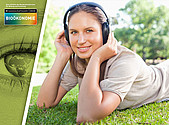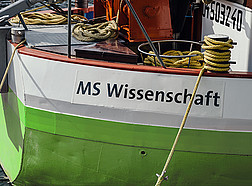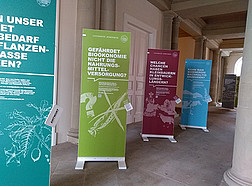 Prof. Dr. Eva Gallmann gibt einen Einblick in die Schweineställe der Zukunft als Beitrag zum Monatsthema im Mai des Wissenschaftsjahres: „Rind, Schwein und Huhn – die Tierhaltung der Zukunft“. Die Expertin aus dem Fachgebiet Verfahrenstechnik der Tierhaltungssysteme forscht an Verbesserungen des Tier- und Umweltschutzes in der Schweinehaltung durch innovative Lösungen beim Bau der Ställe. Neben der Verbesserung des Tierwohls durch verbesserte Haltungsbedingungen liegt ein Fokus von Prof. Dr. Gallmann auch darauf, Treibhausgasemissionen aus den Schweineställen zu vermindern.
Prof. Dr. Eva Gallmann gibt einen Einblick in die Schweineställe der Zukunft als Beitrag zum Monatsthema im Mai des Wissenschaftsjahres: „Rind, Schwein und Huhn – die Tierhaltung der Zukunft“. Die Expertin aus dem Fachgebiet Verfahrenstechnik der Tierhaltungssysteme forscht an Verbesserungen des Tier- und Umweltschutzes in der Schweinehaltung durch innovative Lösungen beim Bau der Ställe. Neben der Verbesserung des Tierwohls durch verbesserte Haltungsbedingungen liegt ein Fokus von Prof. Dr. Gallmann auch darauf, Treibhausgasemissionen aus den Schweineställen zu vermindern.
Dauer: ca. 20 Minuten
Podcast | Dienstag, 9. Juni 2020 | |
Öffentlich | Ebenfalls zu hören auf YouTube, Spotify, Apple, Google |
High-profile kick-off event for the Competence Center "Biodiversity and Integrative Taxonomy”
13 June 2020 | University of Hohenheim | |
| Saturday, 13 June 2020 | Public event | |
Event organizer: in cooperation with: Stuttgart Museum of Natural Science Contact: |
Lecture in the series “Quo vadis Biological Transformation”
Speaker: Prof. Dr. Iris Lewandowski, University of Hohenheim
| Lecture | Monday, 15 June 2020 | 6:30 - 8:00 p.m. | |
| Public event | Free admission | With registration | |
Event organizer: Württembergischer Ingenieurverein (VDI Südwest) | Language: German |
Cancelled due to the Covid-19 pandemic
| 18 June 2020 | University Agriculture Day The agriculture of the future |
Wilderness conservation as a preventive global health strategy
66th Stuttgart Academy discussion of the Academy for Nature and Environmental Protection Baden-Württemberg
Currently, the world is busy dealing with the disastrous health, economic, social, and ecological consequences of the Covid-19 pandemic. It forces us to rethink and requires us to learn from the crisis and focus on preventive measures. The Environmental Academy intends to address these aspects in three digital Stuttgart Academy talks.
The first in the series "Viruses and Visions" will highlight the connections between the development of epidemics and the advance of humans into natural refuges. Many scientists believe that the trade and consumption of certain wild animals, but also the destruction of natural habitats, made the pandemic possible in the first place.
To what extent do humans, in their interaction with nature, create the basis for the transmission of infectious diseases from animals to humans? What does this have to do with the loss of biodiversity? How can wilderness protection prevent future epidemics in the long term?
Competent speakers from the fields of virology, biology, and international nature conservation practice will discuss this topic. The following speakers from the University of Hohenheim are involved:
- Prof. Dr. Friedhelm Göltenboth, Honorary Professor (Prof. hon.) and member of the University of Hohenheim’s Center for Agriculture in the Tropics and Subtropics:
"Nature and humans - nature without humans? When humans intrude into natural refuges" - PD Dr. Gerhard Dobler, Institute for Microbiology of the German Armed Forces in Munich and lecturer at the University of Hohenheim:
"Viruses, zoonoses and pandemics - What are viruses and how do they spread?”
| 18 June 2020 | Web Brunch | Viruses and Visions - Learning from the Covid-19 Crisis - Part I | |
| Public event | Free admission | Registration required | |
Event organizer: Academy for Nature and Environmental Protection (Environmental Academy) of the Baden-Württemberg Ministry of the Environment, Climate and Energy Contact: Nelly Eysholdt (email | Tel. 0711 126 2816) Registration until 10 June 2020 (see above) The link to the livestream will be sent to all registered participants. |
 Prof. Dr. Ralf Vögele, Dean of the Faculty of Agricultural Sciences and Head of the Department of Phytopathology at the University of Hohenheim, will present a third approach in addition to classical, integrated plant cultivation and organic plant production: Cultivation without chemical crop protection, but with mineral fertilizer. Biological plant protection plays a special role in these cultivation systems. The plant protection expert will not only talk about the differences between the three cultivation methods, but will also explain what opportunities biological plant protection in particular offers in terms of sustainability and species protection, how it nevertheless remains economical and where the research at the University of Hohenheim comes in. The episode thus ties in with June’s theme: “Bees, butterflies, and co. - How the bioeconomy contributes to biodiversity”.
Prof. Dr. Ralf Vögele, Dean of the Faculty of Agricultural Sciences and Head of the Department of Phytopathology at the University of Hohenheim, will present a third approach in addition to classical, integrated plant cultivation and organic plant production: Cultivation without chemical crop protection, but with mineral fertilizer. Biological plant protection plays a special role in these cultivation systems. The plant protection expert will not only talk about the differences between the three cultivation methods, but will also explain what opportunities biological plant protection in particular offers in terms of sustainability and species protection, how it nevertheless remains economical and where the research at the University of Hohenheim comes in. The episode thus ties in with June’s theme: “Bees, butterflies, and co. - How the bioeconomy contributes to biodiversity”.
Length: approx. 20 minutes
Podcast (in German) | Tuesday, 23 June 2020 | |
The annual internal project meeting of the EU H2020 Legume Project TRUE is about the exchange and evaluation of different implementation strategies for more beans, peas, etc. (legumes) on European fields and plates. The meeting with the 24 practitioners and research partner institutions from 11 countries was to take place in Hohenheim at the end of June. Due ton Covid-19, it is now planned as a participatory online conference by GFE, which is leading the Knowledge Exchange and Communication work package in the project, and will be held on 23 and 24 June. More information about the project at www.true-project.eu
| 23-24 June 2020 | Internal online project meeting | 4th TRUE General Assembly | |
| Internal event | |
Event organizer: Hohenheim Research Center for Global Food Security and Ecosystem Research (GFE) Contact: Henrik Maaß (email) |




